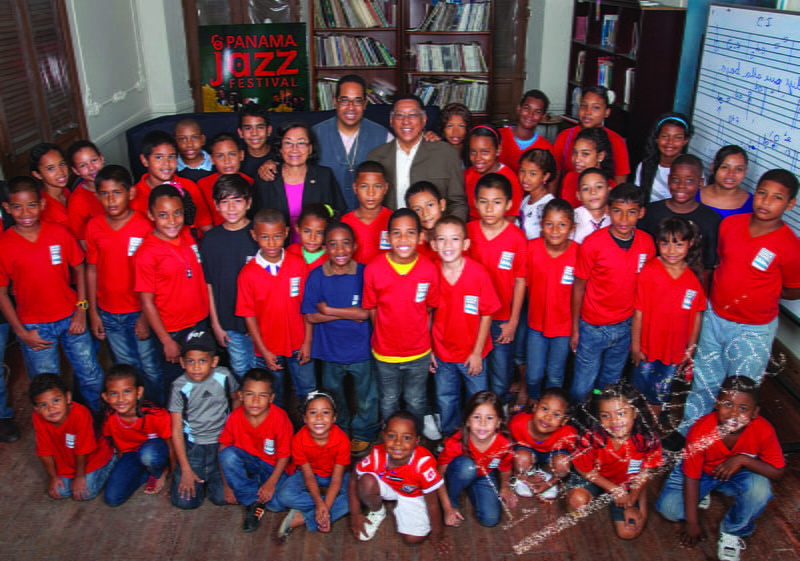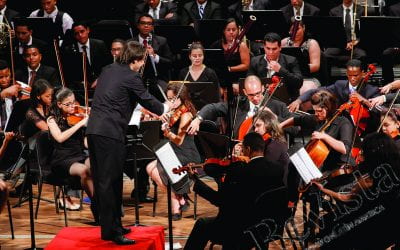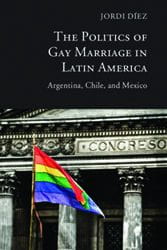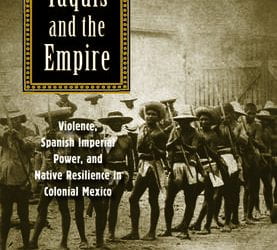Music for Social Change
The Origins of the Danilo Pérez Foundation

Danilo Pérez with his father and mother, taken in 2013 with some of the foundation children. Photo by Bill Bytsura.
When Danilo Pérez Urriola, a salsa singer in Panama, decided to study pedagogy in the 1960s, he faced a difficult challenge: a teaching internship in Colón, one of the poorest cities of the Republic of Panama. As a young and enthusiastic teacher, he accepted troubled teenagers into his classroom, but soon found they had difficulty learning even the simplest subjects because they couldn’t relate to the material.
It was after everyone in the class failed a poetry exam that Pérez (the father of one of the co-authors of this article) began to think that maybe the students were not the problem. He decided to change his teaching methods and started to bring music into the poetry class. Once the poetry was set to music, everyone passed the test, so Pérez started applying music to all the subjects taught in the school system. Within a couple of months, every middle-school class started with a song, and the material content of the class was taught through improvisation or by rearranging traditional songs. Math formulas were taught in the form of repetitive songs, geography lists were simple melodies, and history was a complete improvisation in the key of G. Composition, call and response, melodic development, improvisation and singing a cappella while clapping a repeated clave pattern allowed the students to remember their subject matter. Sometimes, Pérez had to tell them to sing softer during test times and some students began asking if it were okay to simply sing through their tests instead of writing them. Students began to learn and successfully graduate.
This experience—more than fifty years ago—embodies the work and spirit of the Danilo Pérez Foundation, established in 2005, and now run by his son, president of the Foundation in Panama and Cultural Ambassador of the Republic of Panama, as well as Artistic Director of the Berklee Global Jazz Institute in Boston, Massachusetts, and a Unesco Artist for Peace. Projecting his father’s ideas onto the world stage, Pérez Jr. has expanded the concept of music as an instrument of social change.
The Foundation teaches hundreds of children ages 8 to 14, including many from very poor and crime-ridden areas of Panama City. Like his father, Pérez insists that they receive an education in much more than just music. The nonprofit, housed in a former conservatory building, provides a safe place that the Boston Globe once described as “full of instruments, books, and role models who teach principles like respect and honesty alongside rhythm and music theory.”
Despite his father’s efforts in Colón, Pérez finds that over the past 20 years, the overall situation of poverty has only gotten worse in this small corner of Panama, an hour away from Panama City. Disaffected youth who can’t finish school are most likely to be in jail or dead by the age of 20. His father’s students faced much better odds, and today many of them say they still remember many of their teacher’s songs, which led them into more productive lives.
His father’s unpublished 1967 thesis, “Influence of Music on Primary Education,” forms a cornerstone of the Foundation’s philosophy today. The thesis asserts, “Music could serve the education of a child, or education could serve the child to learn music.” Each serves a purpose. For example, a music teacher’s goal is to make the child good at the art and craft of music. In this process, Pérez argues, the purpose may not necessarily be for the child to become a professional musician, but simply for her or him to be able to play, compose or better appreciate the musical arts. Conversely, the use of music to “serve the education of a child” sees music as a universal means by which teachers, parents, community leaders and others can transmit all types of information to the younger generation. In this respect, Pérez recommends that every single teacher in the Republic of Panama should be trained in the study of music sufficiently to use it to teach any subject in the school curriculum. This proposition contends that music holds a pre-eminent place among all academic subjects as the method by which every subject should be taught to make it meaningful for students.
Used in this way, music can bring a sense of coherence to an otherwise disjointed education system. When students are trying to understand why they have to study mathematical subjects they may never use in daily life, they can instantly recognize the essential role of math in music. For example, instead of studying addition, multiplication or division by adding, multiplying or dividing abstract numbers, students can study all this with musical notation, and then can sing or play the math exercise in the form of memorable tunes. Algebraic fractions are physically audible in the form of a whole note that is musically divisible into halfs, quarters and sixteenths. A fractional relationship is therefore directly explained and understood as a component of rhythm, and an elementary example can get as sophisticated as one likes. Thus when a whole note is musically divided into halves, quarters and sixteenths, it can change pitch and form melodic intervals, creating a tune. The same melodic shape can then be enriched with harmony, lyrics and different emotional interpretations, and suddenly a dry mathematical exercise has acquired an abundance of meanings that the student can hear, play and emotionally perceive.
Pérez’s thesis goes on to describe the problems ingrained in Panamanian public education and suggests that the inclusion of music—both as a subject in itself, and as a general method of teaching—can help in these specific ways: it can develop a sense of national identity, encourage school attendance, help with memorizing subject matter and provide vivid experiences for each academic subject. Music education in a national curriculum, his thesis asserts, develops students in six ways: Music helps construct an integral personality and enriches the lives of young people by helping them function in collectives based on emotional intelligence and self-expression. It provides the healthy experience of unifying mind and body and creates aesthetic awareness while also building intellectual skills and the attitude of scholarship. On a larger scale, music develops a national folklore and historical identity.
Danilo Pérez Urriola graduated from the University of Panama with a degree in pedagogy (or “education” as it is known in other countries). His thesis was never published and remains in storage on the shelf of the university library, but his teachings live on in the Danilo Pérez Foundation. It teaches music to paying and scholarship students, but it also builds social responsibility and foments Panamanian culture, transforming its students into respected citizens and constructive members of society
We can see the concrete results of the philosophy of Danilo Pérez Sr. in the fruits of Danilo Pérez Jr.: the Danilo Pérez Foundation and the Panama Jazz Festival, which have funded scholarships for countless students, many of them living in extreme poverty. The Festival has brought more than 250,000 people to Panama, creating both cultural and educational tourism.
These large endeavors bear witness to the legacy of Danilo Pérez Sr. But this inheritance is also present in the small, concrete examples of individual success, of a young man named Joshue, virtually the only youth in his rough neighborhood in Colón who has managed to stay out of jail. It was music that saved him. Or perhaps one should say music as a powerful instrument for social change.
Winter 2016, Volume XV, Number 2
Patricia Zarate, a Chilean-born saxophonist, is the Executive Director of the Panama Jazz Festival and Outreach Coordinator for the Berklee Global Jazz Institute in Boston, Massachusetts. She holds a Bachelor’s Degree in Music Therapy from Berklee College of Music and a Master Degree in Jazz Studies from New York University. www.patriciazarate.net
Danilo Pérez, a Panamanian pianist, has received Grammy awards for his musical projects, as well as awards for his philanthropic work. He performs and leads educational and performance projects with students and professionals all over the world experiencing the power of music for the restoration of humanity.www.daniloperez.com
Related Articles
When Music Changes Lives
English + Español
n 2004, I got a surprising phone call from Santo Domingo on one cold winter night. I was then studying musical composition in Strasbourg, France, a great opportunity for a young Dominican…
The Politics of Gay Marriage in Latin America
Despite its recent successes, the gay rights movement in Latin America is generally ignored in discussions of contemporary Latin American politics. Even students of Latin American social…
The Yaquis and the Empire
Winner of the 2015 Latin American Studies Association Social Science Book Award and runner-up for the 2015 David J. Weber-Clements Prize of the Western History Association, The Yaquis…




